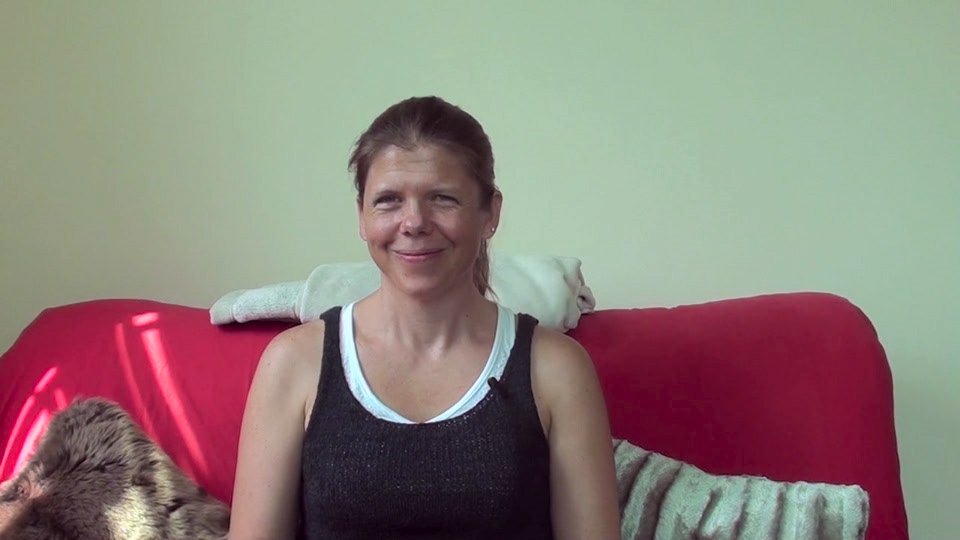
(video) The journey from feeling broken to feeling joy can be an arduous one… one major roadblock for me was the pernicious idea, “But I don’t know how to change!”
This video offers a simple way to challenge that belief… Open the door to the idea that, “I can!”
(article)
So, here’s me, in pain, with a dear friend guiding me gently and skillfully through my desire to change a destructive habit of thinking “I’m not good enough” (I’m not smart enough, skilled enough, experienced enough,beautiful enough, strong enough, etc, etc, etc), and after we get through a big chunk of what was happening for me (I wanted to stay small and unnoticed, so that I would be safe!) I get scared. I hit a big pocket of fear, and out comes my tried and true, “but I don’t know how to do this!”
And I believe it. I convince myself instantly with those eight little words that I can’t do it.
In that moment, everything stops. I can’t actually go any further because, I suddenly believe that I am not capable of change. I believe that I don’t know how and so I shut the door to any next step that could occur.
Slam!
Bummer.
If you believe that you cannot do something, you make it pretty hard to do it.
Practically impossible.
Because, whether you actually can or not, you probably won’t even try.
And if you don’t try then you don’t teach yourself how to do it.
You don’t give yourself the chance to try and figure it out.
You don’t allow yourself the process of learning how.
You don’t learn that actually, you can.
What a bummer.
This is especially problematic when you feel broken in some way, and that there is no way out – that you don’t know how to change it. That you can’t. And of course, the belief that you don’t know how to grow, how to evolve, leads to stagnation. You stay broken.
Double bummer.
And the real kicker is that this is a belief that you can change if you decide to!
Super!
Beliefs are funny things. Often we believe something so deeply or for so long that we believe that it is a fact, something that we can’t change. And once you believe that something is fact, you act as if it is and you create your reality around that. If you believe deeply enough or long enough that you can’t do things then you will begin to live like that. You get your own nice pile of stagnant muck to carry around.
Major bummer.
What to do?
First realize that beliefs are thoughts and thoughts can change.
You think that you cannot do something. You can decide to change that thought and think that you can. You can decide that it is at least worth trying to figure out how… you can decide to play with the idea that you can do it, that you are capable of change, evolution and growth.
Mega Super!
And if you can get that far, and maybe even if you can’t, feel what it feels like to believe that you can. Feel into what that new belief gives you. And if you can begin to believe it, then open up to that belief, entertain it, cultivate it and see what comes to you as a result. So many times in my personal experience and that of my clients, once this shift is made about something, like magic we start noticing all kinds of things that help us accomplish the task at hand.
I decided to try on the belief that I could change my habit of “not good enough” and suddenly quotes started popping up in emails, friends started telling me stories of how they’d changed, my friend lead an EFT session on it, etc, etc, etc.
Miraculous.
Wonderful.
Life changing.
Super nova.
Exercise for Appreciating and Shifting Beliefs
You can do the following life coaching exercise by asking yourself a few questions and feeling into the answers. For stubborn beliefs, it can really help to capture all of your answers on paper.
First, ask yourself, what do I get out of believing that ‘I don’t know how”? What does that give me? How has that helped me in the past and how does it serve me right now?
Capture what comes. Note down, draw or record the words, images, colors, smells, sounds, scenes, memories, etc that flow past.
Once the flow has stopped, rest for a bit and then put all that you have captured in front of you and let any thoughts, emotions and reflections arise. Somethings may become clear now, or maybe not. The point here is to feel into what your past beliefs were. Beliefs aren’t necessarily rational, so you don’t need to understand them, just feel them.
One common feeling here is protection, that you are protecting yourself. Protecting yourself from the pain of failure, derision, abuse, etc may have been really useful in your past.
I was terrified of being abandoned as a child, for instance, and so I thought that I had to be perfect in everything I did. Otherwise I might get abandoned for doing something wrong. Thinking that I didn’t know how to do some things was a way to not do it, and avoid doing it wrong!
Massive bummer.
Recognize that usually we have these beliefs because of things that we experienced in our past and that they made a lot of sense for those situations. We’re very skilled beings at enduring hardship, at navigating traumatic situations and crisis and surviving intact and relatively sane. If you dig deep, you will usually find amazing wisdom in what you did to survive.
Let gratitude surface.
Appreciate the wisdom that allowed to you navigate situations and live to be doing this exercise today.
You’re a smart cookie.
What a relief.
Second, ask yourself, what would happen if the belief that “I don’t know how”, isn’t true? What would it be like to believe that I can do this? How does it feel to believe that I can? How does it feel to believe that I am able to change, grow and evolve around this? What do I get out of the belief that I can?
Again capture what comes, rest and reflect.
Third, usually one of three things will happen now. Either you will see wisdom in changing your belief and you will change it quickly and easily, or you will see the wisdom in changing and yet it will be difficult for you to change, or you will not see wisdom in changing and will keep your old belief (now more assured in your way of thinking).
For the second situation, I offer this advice:
The simplest thing to do in this case is to look at why you believe that you cannot change your belief easily and quickly, and to go through the same process above with this belief.
In fact you can do this process with any belief that you want to challenge and understand better.
If this process isn’t effective for you, play with other methods of belief exploration (EFT, Body Code, etc) and go from there.
In any case, enjoy feeling that you have choices!
Enjoy!,
Elena









